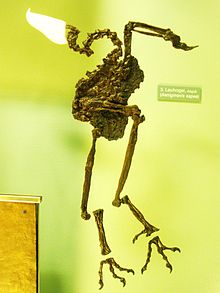鴞鷲屬
鴞鷲(學名:Strigogyps)是一種已滅絕的,生活在中始新世至早漸新世法國與德國的叫鶴目鳥類。其體型可以達到大雞或冠雉的水平,體重可達1千克。骨學研究顯示,鴞鷲不會飛行也不擅奔跑,所以它們的生活方式可能與喇叭鳥相似。不像其他的叫鶴目鳥類,鴞鷲的化石表明這種鳥類很可能是植食動物。[1]
| 鴞鷲屬 | |
|---|---|

| |
| 會鴞鷲化石 | |
| 科學分類 | |
| 界: | 動物界 Animalia |
| 門: | 脊索動物門 Chordata |
| 綱: | 鳥綱 Aves |
| 目: | 叫鶴目 Cariamiformes |
| 科: | †阿氏鳥科 Ameghinornithidae |
| 屬: | †鴞鷲屬 Strigogyps Gaillard, 1908 |
| 模式種 | |
| 疑難鴞鷲 Strigogyps dubius Gaillard, 1908
| |
| 其他種 | |
| |
| 異名 | |
| |

鴞鷲的模式種是疑難鴞鷲(S. dubius)這個物種在1908年由Gaillard描述。[2]鴞鷲最開始被放入鴞形目中,並被認為是智鴞科的一員。疑難鴞鷲的描述基於一塊在法國發現的脛跗骨,這塊脛跗骨在二戰期間的慕尼黑大轟炸中被毀,但其鑄模幸而保存。1939年,Gaillard基於肱骨,兩個烏喙骨,兩個腕掌骨描述了鴞鷲屬的第二個物種,小鴞鷲(S. minor)。1981年,Mourer-Chauviré將小鴞鷲重新描述為小阿氏鳥(Ameghinornis minor),將其視為恐鶴科下阿氏鳥亞科(Ameghinornithinae)的唯一成員。[3]阿氏鳥隨後被單獨列入阿氏鳥科(Ameghinornithidae)。1987年,Peters基於德國梅塞爾坑發現的新標本命名了阿氏鳥科的另外一個物種,會愛尼格瑪鳥(Aenigmavis sapea)。[4]Mayr在2005年發現愛尼格瑪鳥應該屬於鴞鷲屬,也就是會鴞鷲(S. sapea),並發現小阿氏鳥是疑難鴞鷲的同物異名,因為這兩個物種都來自凱爾西且除了烏喙骨和腕掌骨之外兩者幾乎完全相同,其他一些不像屬於阿氏鳥科的阿氏鳥標本,可能屬於異形鳥科(學名:idiornithid)。[5]

1935年, Lambrecht描述了一種新的美洲鷲,Eocathartes robustus,和一種犀鳥Geiseloceros robustus。兩者都來自中始新世德國的蓋澤爾谷(Geisel Valley)。兩者都基於單一標本且兩者是一同發現的。[6] Mayr在2007年發現他們應該屬於同一個物種,而且應當放入鴞鷲屬下,也就是強健鴞鷲(S. robustus)。[7]
最近研究(Alvarenga and Höfling 2003, Mayr 2005)發現鴞鷲可能是叫鶴目中更基幹的成員,而且與恐鶴關係並不是很近。[5][8]另一種在梅塞爾坑發現的叫鶴目鳥類,薩米拉鳥形態上比鴞鷲更加基幹。 [9]
參考來源
編輯- ^ Gerald Mayr, Exceptionally preserved plant parenchyma in the digestive tract indicates a herbivorous diet in the Middle Eocene bird Strigogyps sapea (Ameghinornithidae)
- ^ Gaillard, C. (1908). Les oiseaux des Phosphorites du Quercy. - Annales del'Université de Lyon (Nouvelle Série) 23: 1-178.
- ^ Mourer-Chauviré, C. 1981. Première indication de la présence de Phorusrhacidés, famille d'oiseaux géants d'Amérique du Sud, dans le Tertaire européen: Ameghinornis nov. gen. (Aves, Ralliformes) des Phosphorites du Quercy, France. Géobios 14, 637-647.
- ^ Peters, Dieter Stefan (1987): Ein "Phorusrhacidae" aus dem Mittel-Eozän von Messel (Aves: Gruiformes: Cariamae). Documents des Laboratoires de Géologie de Lyon 99: 71-87. [Article in German]
- ^ 5.0 5.1 Mayr, Gerald (2005): "Old World phorusrhacids" (Aves, Phorusrhacidae): a new look at Strigogyps ("Aenigmavis") sapea (Peters 1987). PaleoBios (Berkeley) 25(1): 11-16 HTML abstract (頁面存檔備份,存於網際網路檔案館)
- ^ Lambrecht, K . (1935). Drei neue Vogelformen aus dem Lutétian des Geiseltales. - Nova Acta Leopoldina, Neue Folge 3: 361 - 367.
- ^ Mayr, Gerald (2007). Synonymy and actual affinities of the putative Middle Eocene "New World vulture" Eocathartes Lambrecht, 1935 and "hornbill" Geiseloceros Lambrecht, 1935 (Aves, Ameghinornithidae). Paläontologische Zeitschrift 81, 457-462.[1] (頁面存檔備份,存於網際網路檔案館)
- ^ Alvarenga, Herculano M. F. & Höfling, Elizabeth (2003): Systematic revision of the Phorusrhacidae (Aves: Ralliformes). Papéis Avulsos de Zoologia 43(4): 55-91 PDF fulltext (頁面存檔備份,存於網際網路檔案館)
- ^ Mayr, G. 2002. A new specimen of Salmila robusta (Aves: Gruiformes: Salmilidae n. fam.) from the Middle Eocene of Messel. Paleontologische Zeitschrift 76(2/2): 305-316.
- Peters, Dieter Stefan (2007): The fossil family Ameghinornithidae (Mourer-Chauviré 1981): a short synopsis. Journal of Ornithology 148(1): 25–28. doi:10.1007/s10336-006-0095-z PDF fulltext